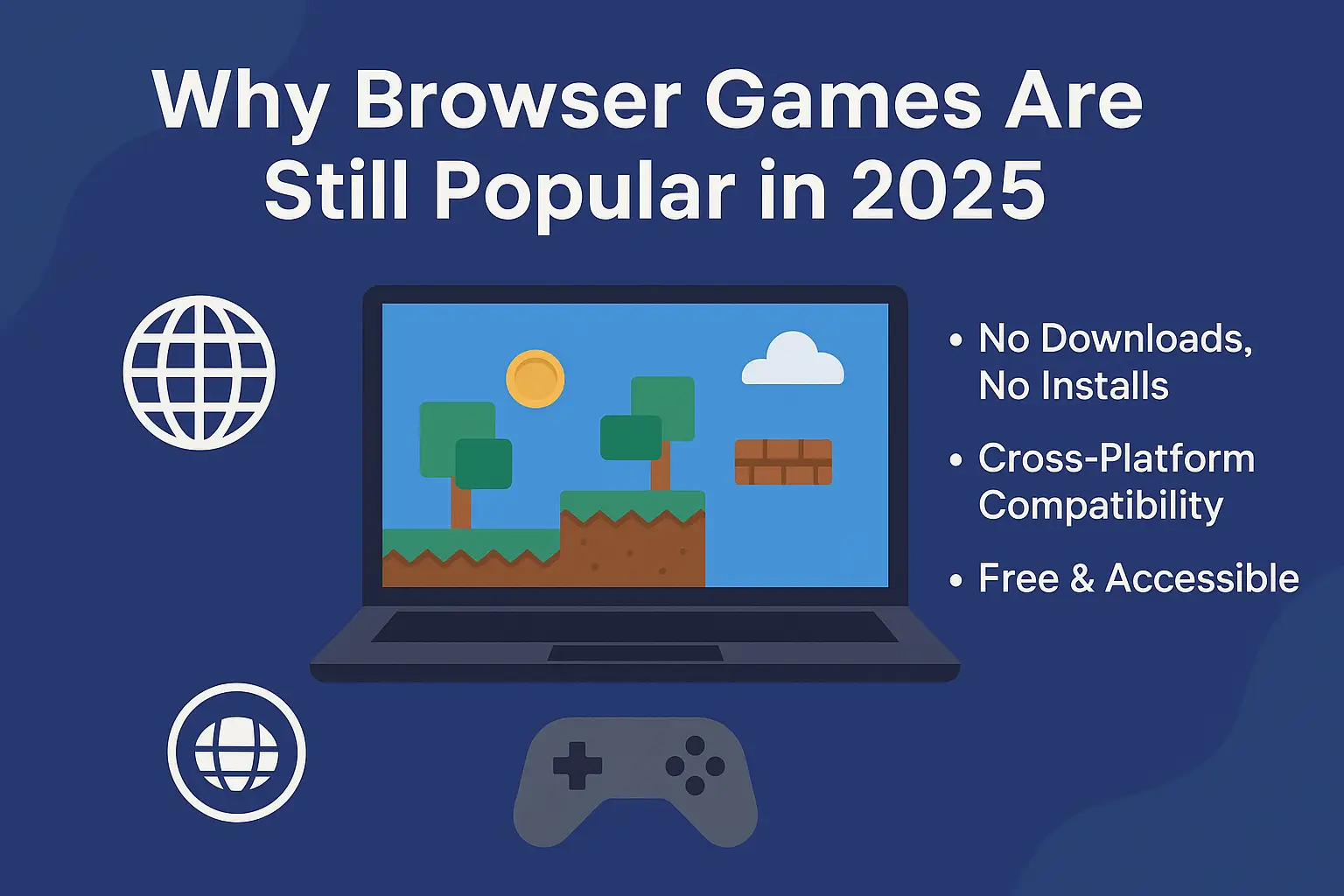Introduction
“Why Browser games are still popular in 2025”? —Browser games have come a long way since the late ’90s and early 2000s. Back then, platforms like Miniclip, Newgrounds, and Kongregate hosted simple Flash and Java games that anyone could play instantly. Titles like Club Penguin, Neopets, and Runescape Classic defined an entire generation of casual gamers.

These games were lightweight, required no installation, and turned classrooms, offices, and homes into casual gaming hubs. Anyone with a browser could jump in and play, making them one of the most democratic forms of gaming.
But in 2025, with powerful consoles, cloud platforms, and mobile apps everywhere, why are browser games still thriving? The answer lies in their simplicity, accessibility, and ability to evolve with technology.
Why Browser Games Still Matter in 2025
1. No Downloads, No Installs
In an age where AAA games require 50–100GB downloads and frequent patches, browser games are refreshingly lightweight. Just open a tab, and you’re playing within seconds. This “instant access” makes them especially appealing to players with limited storage or slower internet.
Example: Slither.io gained over 68 million players in its first year because of its zero-download accessibility.
2. Cross-Platform Compatibility
Modern browser games built with HTML5, WebGL, and WebAssembly run smoothly across devices. Unlike traditional games that require specific hardware or operating systems, browser games adapt seamlessly.
You can start a puzzle on your office PC, continue on your phone during a commute, and finish on your home tablet all without syncing or separate accounts.
3. Lightweight but Fun
Browser games are designed for quick, snack-sized entertainment. They load fast, use minimal resources, and work even on older laptops or budget smartphones. This makes them especially popular in regions where high-end hardware isn’t common.
According to Statista, over 1 billion people play casual games worldwide — many of them browser-based.
4. Free & Accessible
Most browser games are free-to-play, with optional ads or small upgrades. This lowers the barrier for entry, making them a perfect fit for students, casual gamers, and people who don’t want to spend money on entertainment.
Sites like CoolMathGames and Poki attract millions of monthly visitors by offering free games that run instantly in browsers.
5. Creativity from Indie Developers
One of the most beautiful aspects of browser games is how they empower independent developers. Without big budgets or publishing deals, small teams (or even solo devs) can launch games that reach millions.
At Aklic, for example, we focus on building educational and fun mini-games, from math puzzles to alphabet games. These prove that even small-scale projects can make a big impact.
The Current State of Browser Games
Browser games in 2025 are far from “simple time-wasters.” They are smarter, faster, and more diverse than ever before.
Better Graphics & Performance: Thanks to WebGL and frameworks like Three.js, browser games can now feature 3D environments, physics, and effects once limited to consoles.
Educational Value: Teachers and parents use browser games to make learning fun. Websites like ABCya and CoolMathGames turn math and logic into interactive challenges.
Indie Monetization: With platforms like AdSense, itch.io, and Patreon, indie developers finally have ways to monetize games while keeping them free-to-play.
The Future of Browser Games: What’s Next?
The future of browser games looks brighter than ever. Here are the top trends shaping 2025 and beyond:
1. AI-Powered Gameplay
AI is making browser games more personalized. Imagine puzzles that adjust difficulty automatically, or quizzes that adapt to your learning speed.
2. Web3 & Blockchain
NFTs and decentralized gaming economies are slowly entering browsers. This could allow players to own in-game assets that work across multiple platforms.
3. Multiplayer & Cloud Gaming
With WebRTC and faster internet, fully browser-based multiplayer games are becoming mainstream. Browser shooters like ‘Krunker’ and strategy titles like ‘Forge of Empire’ already support millions of players.
4. Offline Capabilities
Progressive Web Apps (PWAs) allow browser games to run offline, making them reliable even without internet. This is especially important for mobile-first regions.
5. Immersive Tech (VR & AR)
WebXR is opening doors for VR and AR games that run directly in browsers. In the near future, you could be exploring a 3D world with just a headset and Chrome tab.
FAQs About Browser Games
Q1. Are browser games safe?
Yes, as long as you play on trusted sites. Avoid suspicious pop-ups or unknown downloads.
Q2. Do browser games work on smartphones?
Absolutely! Most modern browser games are mobile-friendly and play smoothly on iOS and Android.
Q3. Are browser games dying?
Not at all. While Flash ended in 2020, HTML5 revived browser gaming. In fact, the audience continues to grow thanks to accessibility.
Q4. Can browser games be educational?
Yes. Sites like Aklic and CoolMathGames prove that games can teach math, spelling, logic, and more while keeping kids engaged.
Q5. How do browser games make money?
Through ads (AdSense), microtransactions, sponsorships, or crowdfunding platforms like Patreon.
Final Thoughts
Browser games may have started as simple distractions, but in 2025 they remain popular, innovative, and inclusive. They are fun, accessible, and constantly evolving with technology.
Whether you’re a casual gamer killing time, a student learning math through puzzles, or a developer experimenting with new ideas — browser games have something to offer everyone.
At Aklic, our vision is to create lightweight, educational, and meaningful browser games that anyone can play, anytime, anywhere.
